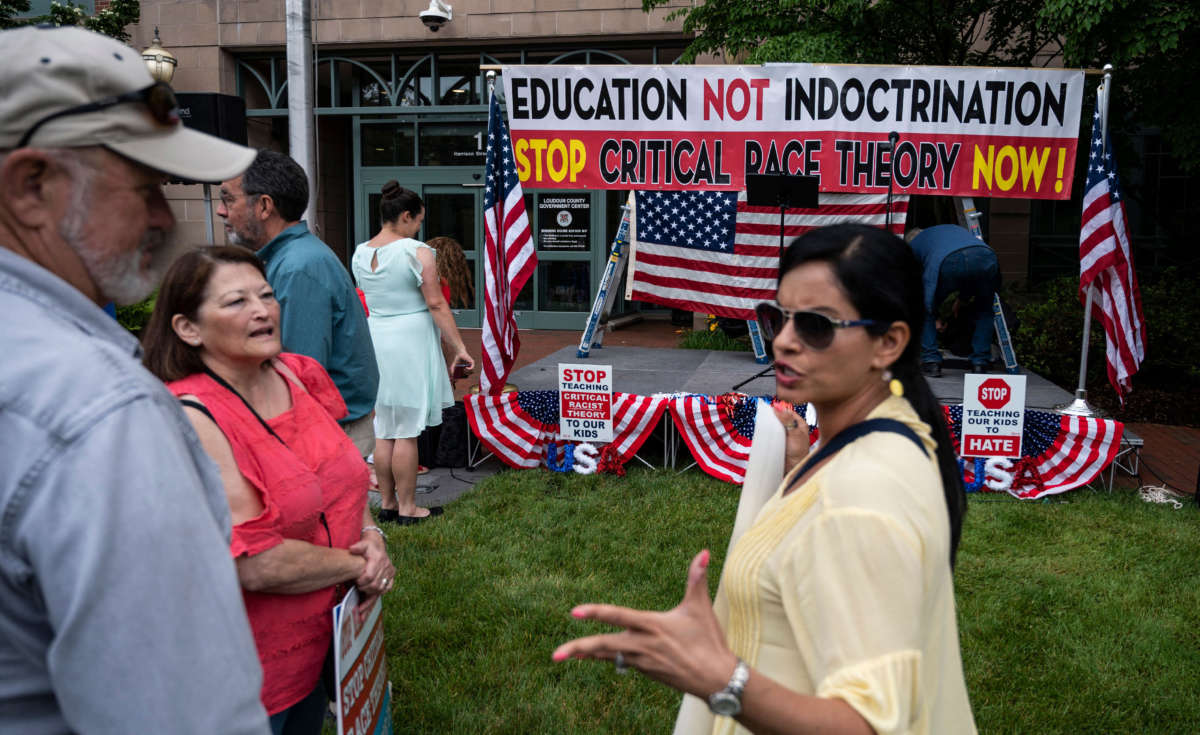As a right-wing fear campaign against the teaching of critical race theory (CRT) in schools across the country shows no signs of abating, several educators are leaving the profession to avoid facing the sometimes dangerous rage and rhetoric of conservative activists, who often demonstrate a total misunderstanding of CRT.
A report from NBC News published on Monday morning details how a “small but growing number of educators” are leaving schools because conservative parents and community members are accusing them of teaching CRT in the classrooms.
Critical race theory is a decades-old academic framework for studying law that seeks to understand how race and gender shape laws and policies in the United States. It is most often taught at the college or university level, and rarely seen or discussed in K-12 classrooms.
Nevertheless, conservative commentators, lawmakers and news organizations (particularly Fox News) have launched a campaign of fear and disinformation focused on CRT — a concept that they rarely can explain, yet they insist that children are being indoctrinated by educators that are supposedly teaching it to them.
The report from NBC News detailed several examples of educators leaving their jobs over threats from parents who are attacking CRT. Four administrators in Southlake, Texas, for instance, have left their positions after receiving immense backlash for crafting a plan to combat racial and cultural discrimination in their district. A Black woman in the Rockwood School District in Eureka, Missouri, resigned from her administerial role after she received threats of violence, which were so severe that she hired a private security agency to monitor her home.
Other teachers and administrators are trying to keep their jobs but are facing pressure from their districts to resign or be terminated. In Sullivan County, Tennessee, a white educator assigned his students to read an essay by writer Ta-Nehisi Coates, and also showed a video of a female poet discussing white privilege. That teacher is fighting a termination notice from the district over accusations that he did not show opposing viewpoints.
A teacher in Jacksonville, Florida, was also fired for having a Black Lives Matter banner in her classroom, in a school named after Confederate general Robert E. Lee. The teacher is suing to be reinstated.
In many of these cases, it doesn’t appear that the debate on CRT is interested in fact-based conversations, Rydell Harrison, a former superintendent at a Connecticut school district, said in comments to NBC News.
“In education, we have responded to opposition with truth and facts and being able to say, ‘Yeah, I can see why that’d be a concern, but this is what is really happening,'” Harrison said. “In most cases that works for us. But when facts are no longer part of the discussion, our tools to reframe the conversation and get people back on board are limited.”
Harrison, who was the first Black superintendent of the district in which he served, resigned in June due to conservative parents and others in the community alleging a task force on racial issues he set up was pushing an “agenda,” labeling him as an “activist” trying to indoctrinate their children with CRT.
Conservatives have sought to make CRT into a new “boogeyman,” David E. Kirkland, professor of urban education at New York University and the executive director of NYU Metro Center, wrote in Truthout.
“But in the context of education, this boogeyman is more of a strawman, because the very thing being called critical race theory to scare many Americans isn’t critical race theory at all,” Kirkland wrote.
Those who oppose CRT oftentimes don’t understand what it is exactly they’re railing against.
“Critical race theory is not just a set of ideas, though; it is a fundamental adjustment for how we should look at the world and see the realities that a focused lens on structural inequities might present,” Kirkland wrote. “Thus, as much as it offers ideas, critical race theory offers evidence, a lens to both see and question that world that we live in.”
That hasn’t stopped Republican lawmakers in state legislatures from trying to restrict schools, colleges and universities from teaching CRT. There are at least 22 states that have made such attempts, through legislation and other legal efforts, which are being opposed by teachers’ unions across the country.
In Texas, for instance, a bill was recently passed that would restrict how teachers can discuss current events, ban students from receiving course credit for engaging in civic activities, and would purportedly restore “traditional history” to classrooms by emphasizing the ideals of the United States over actual record and history of racism.
“Culture warriors are labeling any discussion of race, racism and discrimination as CRT to try to make it toxic,” Randi Weingarten, president of the American Federation of Teachers, recently said. “They’re bullying teachers and trying to stop us from teaching students accurate history. This harms students.”
Weingarten, who noted that CRT “is not taught in elementary schools or middle schools or high schools,” said that AFT has established a legal defense fund for any teacher that’s part of their union who “gets in trouble” for teaching “honest history.”
Join us in defending the truth before it’s too late
The future of independent journalism is uncertain, and the consequences of losing it are too grave to ignore. To ensure Truthout remains safe, strong, and free, we need to raise $31,000 in the next 48 hours. Every dollar raised goes directly toward the costs of producing news you can trust.
Please give what you can — because by supporting us with a tax-deductible donation, you’re not just preserving a source of news, you’re helping to safeguard what’s left of our democracy.
